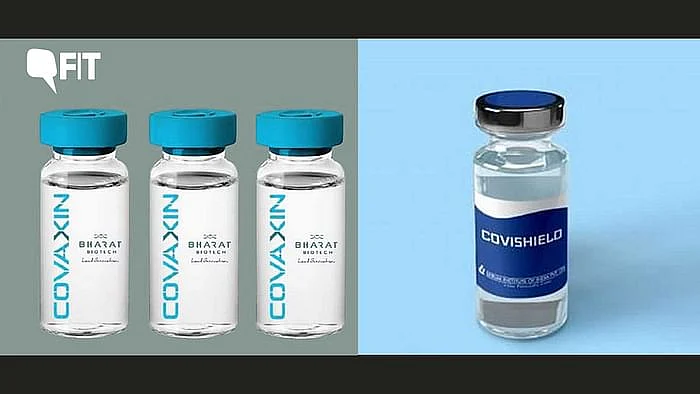
No Choice Between Covishield & Covaxin: Is that Problematic?
Why do you not have the option to choose? And, why are healthcare workers worried? Here’s all you need to know.

advertisement
Preparation is underway across India as the vaccination drive against the novel coronavirus, with several states receiving doses of ‘Covishield’ and ‘Covaxin.’ The administration of vaccine is all set to begin on 16 January.
But will you be given a choice between the two vaccines? And, why are healthcare workers worried? Here’s all you need to know.
Can I choose which vaccine I will be administered?
No, not in the first phase of vaccination at least. Frontline and healthcare workers, who will primarily be vaccinated in the first phase, will be administered the vaccine available in the allotted site. This could be either ‘Covishield’ or ‘Covaxin.’
Is the option to choose vaccines available in other countries?
Nope, the option is not available in any of the 45-odd countries that have started coronavirus vaccination. For example, in the United States both Pfizer and Moderna vaccine has been given the emergency use authorisation. However, people do not have the option to choose.
Speaking at a press conference on 12 January, the Union Health Secretary Rajesh Bhushan gave examples of how vaccines have been rolled out around the world.
Why do I not have the option to choose between vaccines?
Paucity of supply and sluggish distribution are cited as reasons for this.
Elaborating on this, Niti Aayog member Dr VK Paul said, "All the vaccines in the world used currently against COVID-19 have been cleared under the emergency-use framework. As we go ahead, we will have more options. India has also been able to get these vaccines at very competitive prices.’’
Since I have to get two doses, can I choose a different vaccine for second dose?
Not at all. The vaccine you are given for first dose should be the very vaccine you receive the second time around as well.
For example, if Covishield is given to you the first time around, the same should be administered for round two as well.
But wasn’t Covaxin said to be the ‘backup’ vaccine? Why are they administering it?
Speaking with FIT right after Covaxin was granted approval, Dr Randeep Guleria of AIIMS said: "If one reads what’s been shared, the vaccine has been approved for ‘emergency situation out of abundance of precaution.’ I think because of what is happening in the US, UK and Europe, if India has a surge in cases, and an emergency situation arises, we will need more doses and there is no drug available, then this (Covaxin) vaccine may be made available. Otherwise it will be Covishield that will be used."
However, 10 days later on 13 January, Covaxin doses manufactured by Bharat Biotech reached 10 cities across the country – making it formal that this vaccine was no ‘backup.’
The government has inked a deal with the pharma major for nearly 55 lakh doses, at a cost of Rs 295/dose. Of these nearly 17.5 lakh doses will be provided for free.
The government defended its stance, with Dr Paul saying the vaccine has been tested on “thousands of people and it is safe."
Is Phase 3 trials for Covaxin over?
No, recruitment for phase three trial ended less than a week ago. So the government's claim that the vaccine has been tested on '1000s of people' does not paint the full picture.
Isn’t this problematic? How will the government administer a vaccine in ‘clinical trial mode’?
Professor K Srinath Reddy, Chairperson, Public Health Foundation of India, in an editorial in The Quint had said, "Will the Phase 3 trial continue as a blinded two-arm trial, even as others receive the vaccine with monitoring of efficacy and safety? If so, the latter will not have a comparison group. Will Phase 3 and Phase 4 (post-licensure surveillance) data be gathered simultaneously but analysed separately?"
These are complicated questions. Dr JVR Prasad Rao, Former Union Health Secretary, in a conversation with The Quint's podcast team, acknowledges these challenges.
Are healthcare workers worried about lack of transparancy?
Some healthcare workers, first in line to receive the jab, told FIT that lack of transparency around the vaccines is giving rise to hesitancy among them.
"Both vaccines are publicly funded and both have issues with lack of data. For Covaxin, phase 3 trials are still ongoing and no raw data is available. For both Covishield and Covaxin, information around adverse events remains opaque. There is concern among doctor groups regarding the roll-out, specially around adverse events involving neurological symptoms," says Dr Sumit Ray, Critical Care specialist at Delhi's Holy Family Hospital.
Malini Aisola, co-convenor of the All India Drug Action Network, tweeted about lack data on the 4-week dosing schedule that has been approved by the government for Covishield. The Indian bridge trials for the Oxford AstraZeneca vaccine, being manufactured in India by Serum Institute, are still ongoing.
Speaking with FIT, Dr Gangandeep Kang, virologist from CMC Vellore, had said, "The question is at what point do you give approval, even a restricted approval. To me it is very important that we have both safety and efficacy data. I have worked with vaccines long enough to know that immunogenicity does not equate to efficacy. So I would really like to see some clinical efficacy data for Bharat Biotech before it is widely used."
(This was first published on FIT and has been republished with permission.)
(At The Quint, we question everything. Play an active role in shaping our journalism by becoming a member today.)
- Access to all paywalled content on site
- Ad-free experience across The Quint
- Early previews of our Special Projects
Published: undefined